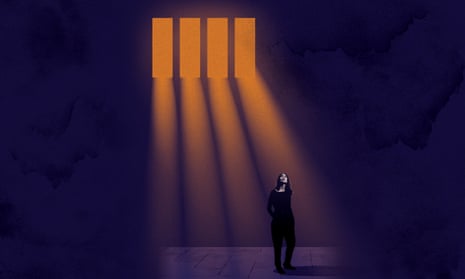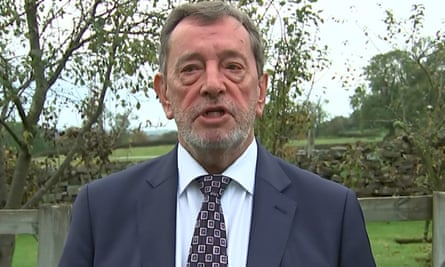THE GUARDIAN
Thu 18 May 2023

Victoria was sentenced to 21 months but has served 15 years. Even the politician who introduced indefinite detention now says he regrets it
There are those of us who exist in a more or less free society. And there are those who, while also living within the borders of the United Kingdom, exist in a police state. If the rest of us knew these people existed and what was being done to them in our name, we would scarcely believe it.
No one, including Victoria Carter (an assumed name), would deny that her crimes warranted a significant prison sentence. She had come from a terrible place: a father who beat her up, an alcoholic mother whose friends sexually abused her, extreme poverty as all the money was spent on drink. As a young teenager, she ran away from home, after which she had more than 10 placements in foster care and care homes. She responded with anger, violence and self-destruction.
As a teenager, she was convicted of criminal damage and burglary. She tried to kidnap a man she believed had abused her younger sister. She then went through a phase of alcoholism, during which she had sex with two underage teenagers, leading to a conviction for sexual offences. In an alcoholic rage, she set light to photos of her mother, scorching the carpet of her lodgings and earning herself an arson conviction.
In 2007, in her early twenties, she was prosecuted for actual bodily harm, among other offences. Her lawyer told her to expect a sentence of up to four years. This, the judge remarked, was roughly what she would have got under different circumstances: three and a half years. But instead he handed down a sentence of “imprisonment for public protection” (IPP).
IPP sentences were introduced in England and Wales by the New Labour government as it sought to prove it was tough on law and order in the Criminal Justice Act 2003. If an offender had previously been convicted of one of 153 offences deemed to present a danger to the public, and had then committed another such crime, the courts had no choice but to impose either an IPP sentence or life imprisonment. IPP means indefinite detention.
The crimes that qualified were wide-ranging. One defendant received an IPP sentence with a minimum term of just 28 days, but extended indefinitely. Another was imprisoned with a tariff of two years for stealing a bicycle. He served 12 and is now in a mental health institution.
These sentences included a “tariff”: the period after which the prisoner could be assessed for release. Victoria’s was 21 months. But IPP sentences carry a presumption against parole. Rather than the Parole Board having to prove that a prisoner presents a danger to the public, the prisoner has to prove that they don’t. As the then justice secretary, Kenneth Clarke, said in 2011: “It is almost impossible for the prisoner to prove that, so … hardly any are released.”


George Monbiot is a Guardian columnist
This article was amended on 18 May 2023. An earlier version said that at the end of last year, 2,892 IPP prisoners remained behind bars, and that almost 97% were more than two years beyond their tariff date and nearly half were 10 years beyond. That meant to refer to government figures, which showed that of the 2,892 IPP prisoners who remained behind bars, 1,498 were recalled back to prison and 1,394 had never been released. Of the latter group, almost 97% of prisoners were more than two years past their tariff date, and nearly half were 10 years beyond it.

Illustration: Alex Mellon/The Guardian
Victoria was sentenced to 21 months but has served 15 years. Even the politician who introduced indefinite detention now says he regrets it
There are those of us who exist in a more or less free society. And there are those who, while also living within the borders of the United Kingdom, exist in a police state. If the rest of us knew these people existed and what was being done to them in our name, we would scarcely believe it.
No one, including Victoria Carter (an assumed name), would deny that her crimes warranted a significant prison sentence. She had come from a terrible place: a father who beat her up, an alcoholic mother whose friends sexually abused her, extreme poverty as all the money was spent on drink. As a young teenager, she ran away from home, after which she had more than 10 placements in foster care and care homes. She responded with anger, violence and self-destruction.
As a teenager, she was convicted of criminal damage and burglary. She tried to kidnap a man she believed had abused her younger sister. She then went through a phase of alcoholism, during which she had sex with two underage teenagers, leading to a conviction for sexual offences. In an alcoholic rage, she set light to photos of her mother, scorching the carpet of her lodgings and earning herself an arson conviction.
In 2007, in her early twenties, she was prosecuted for actual bodily harm, among other offences. Her lawyer told her to expect a sentence of up to four years. This, the judge remarked, was roughly what she would have got under different circumstances: three and a half years. But instead he handed down a sentence of “imprisonment for public protection” (IPP).
IPP sentences were introduced in England and Wales by the New Labour government as it sought to prove it was tough on law and order in the Criminal Justice Act 2003. If an offender had previously been convicted of one of 153 offences deemed to present a danger to the public, and had then committed another such crime, the courts had no choice but to impose either an IPP sentence or life imprisonment. IPP means indefinite detention.
The crimes that qualified were wide-ranging. One defendant received an IPP sentence with a minimum term of just 28 days, but extended indefinitely. Another was imprisoned with a tariff of two years for stealing a bicycle. He served 12 and is now in a mental health institution.
These sentences included a “tariff”: the period after which the prisoner could be assessed for release. Victoria’s was 21 months. But IPP sentences carry a presumption against parole. Rather than the Parole Board having to prove that a prisoner presents a danger to the public, the prisoner has to prove that they don’t. As the then justice secretary, Kenneth Clarke, said in 2011: “It is almost impossible for the prisoner to prove that, so … hardly any are released.”

‘David Blunkett: ‘I got it wrong. The government now have the chance to get it right.’’
Photograph: ITV/REX/Shutterstock
Those who do manage to get out face a “life licence”, which cannot be reviewed for at least 10 years. The licence conditions are extremely strict. Released IPP prisoners can be sent back for infractions as petty as a missed probation appointment because their bus did not arrive, or even because the support service they were instructed to use no longer exists
In 2012, after widespread condemnation and a ruling by the European court of human rights that such sentences were “arbitrary and therefore unlawful”, IPP terms were abolished by the Conservative government. But the measure was not retrospective. As of the end of last year, 2,892 IPP prisoners remained behind bars. Of these, 1,498 were recalled back to prison and 1,394 had never been released; of this latter group, almost 97% of prisoners were more than two years past their tariff date, and nearly half were 10 years beyond it. Victoria was released at the beginning of this year, after serving more than 15 yearsof a 21-month tariff.
The former supreme court justice Lord Brown has called IPP sentences “the greatest single stain on the justice system”. When Michael Gove was justice secretary, he recommended “executive clemency” for IPP prisoners who had served terms much longer than their tariffs. But he didn’t act on it. David Blunkett, the Labour home secretary who introduced the sentences, regrets them, stating: “I got it wrong. The government now have the chance to get it right.”
But the government, always glancing at the media, refuses to take it. In February, it rejected the recommendation of the House of Commons justice committee that remaining IPP prisoners should be resentenced. Successive justice secretaries have failed to use the power they acquired in 2012 to introduce a presumption of release. So while people who committed far worse crimes come and go, IPP prisoners are forgotten, cast into a judicial oubliette from which some might never emerge.
The effects on their mental health of never knowing when or whether they might be released can be devastating. Rates of self-harm among these prisoners are more than twice as high as among prisoners serving life sentences.
In March 2008, when she began to understand what her sentence really meant, Victoria tried to kill herself, and very nearly succeeded. But then she became determined to sort herself out. She took every available course of psychotherapy and counselling, sat GCSE exams and started an Open University degree. She knew she wasn’t ready for parole when her tariff ended. Two years later, she didn’t qualify on the grounds that, through her own choice, she was still taking a psychotherapeutic course. But after a further two years, when she came up for parole again, she had turned her life around. Unfortunately, the standards of proof required for parole were impossible to meet.
Her application was refused and she spiralled into despair. She lost three and a half stone, started self-harming and taking drugs. She attempted suicide again. She became trapped in a vicious cycle. Being refused parole causes severe mental health problems for IPP prisoners, but mental illness is one of the criteria for the refusal of parole. So down they spiral. Instead of seeking help, some try to hide their problems from staff so as not to jeopardise their chances. Severe cuts have restricted the courses these prisoners can take, without which they have no hope of release.
Victoria is a remarkable woman: honest about what she was and what she did, acutely aware of the pain she caused, determined to lead a useful and purposeful life. But, close to 40, she is constantly confronted by the missing years. “I deserved to be punished,” she told me. “But did I deserve more than 15 years? No. I have days when I just sob in my bed. Just to get out some of the sadness of what I have lost.”
A great wrong has been done. Almost everyone in power accepts it is wrong. But none are prepared to address it.
Those who do manage to get out face a “life licence”, which cannot be reviewed for at least 10 years. The licence conditions are extremely strict. Released IPP prisoners can be sent back for infractions as petty as a missed probation appointment because their bus did not arrive, or even because the support service they were instructed to use no longer exists
In 2012, after widespread condemnation and a ruling by the European court of human rights that such sentences were “arbitrary and therefore unlawful”, IPP terms were abolished by the Conservative government. But the measure was not retrospective. As of the end of last year, 2,892 IPP prisoners remained behind bars. Of these, 1,498 were recalled back to prison and 1,394 had never been released; of this latter group, almost 97% of prisoners were more than two years past their tariff date, and nearly half were 10 years beyond it. Victoria was released at the beginning of this year, after serving more than 15 yearsof a 21-month tariff.
The former supreme court justice Lord Brown has called IPP sentences “the greatest single stain on the justice system”. When Michael Gove was justice secretary, he recommended “executive clemency” for IPP prisoners who had served terms much longer than their tariffs. But he didn’t act on it. David Blunkett, the Labour home secretary who introduced the sentences, regrets them, stating: “I got it wrong. The government now have the chance to get it right.”
But the government, always glancing at the media, refuses to take it. In February, it rejected the recommendation of the House of Commons justice committee that remaining IPP prisoners should be resentenced. Successive justice secretaries have failed to use the power they acquired in 2012 to introduce a presumption of release. So while people who committed far worse crimes come and go, IPP prisoners are forgotten, cast into a judicial oubliette from which some might never emerge.
The effects on their mental health of never knowing when or whether they might be released can be devastating. Rates of self-harm among these prisoners are more than twice as high as among prisoners serving life sentences.
In March 2008, when she began to understand what her sentence really meant, Victoria tried to kill herself, and very nearly succeeded. But then she became determined to sort herself out. She took every available course of psychotherapy and counselling, sat GCSE exams and started an Open University degree. She knew she wasn’t ready for parole when her tariff ended. Two years later, she didn’t qualify on the grounds that, through her own choice, she was still taking a psychotherapeutic course. But after a further two years, when she came up for parole again, she had turned her life around. Unfortunately, the standards of proof required for parole were impossible to meet.
Her application was refused and she spiralled into despair. She lost three and a half stone, started self-harming and taking drugs. She attempted suicide again. She became trapped in a vicious cycle. Being refused parole causes severe mental health problems for IPP prisoners, but mental illness is one of the criteria for the refusal of parole. So down they spiral. Instead of seeking help, some try to hide their problems from staff so as not to jeopardise their chances. Severe cuts have restricted the courses these prisoners can take, without which they have no hope of release.
Victoria is a remarkable woman: honest about what she was and what she did, acutely aware of the pain she caused, determined to lead a useful and purposeful life. But, close to 40, she is constantly confronted by the missing years. “I deserved to be punished,” she told me. “But did I deserve more than 15 years? No. I have days when I just sob in my bed. Just to get out some of the sadness of what I have lost.”
A great wrong has been done. Almost everyone in power accepts it is wrong. But none are prepared to address it.

George Monbiot is a Guardian columnist
This article was amended on 18 May 2023. An earlier version said that at the end of last year, 2,892 IPP prisoners remained behind bars, and that almost 97% were more than two years beyond their tariff date and nearly half were 10 years beyond. That meant to refer to government figures, which showed that of the 2,892 IPP prisoners who remained behind bars, 1,498 were recalled back to prison and 1,394 had never been released. Of the latter group, almost 97% of prisoners were more than two years past their tariff date, and nearly half were 10 years beyond it.
No comments:
Post a Comment